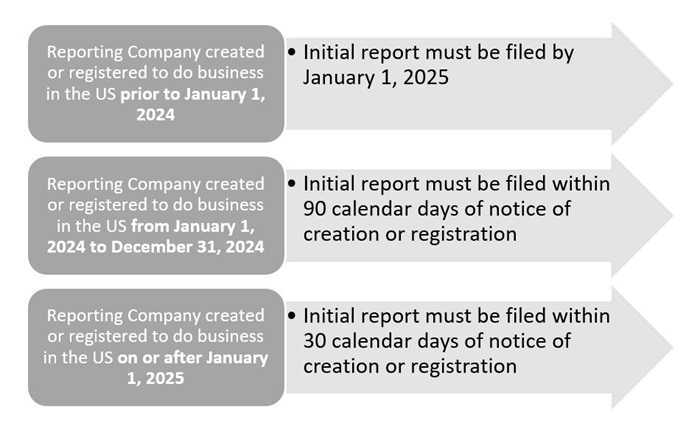
Publication
HKEx's commitment to sustainability: The new phase of paperless regulatory reform
In recent years, the Hong Kong Stock Exchange (HKEx) has introduced several initiatives to digitize its regulatory processes.


United States | Publication | 一月 2024
On January 1, 2024, the US Department of the Treasury’s Financial Crimes Enforcement Network (FinCEN) opened the Beneficial Ownership Information Registry and began accepting the beneficial ownership information reports required under the Corporate Transparency Act (CTA). The CTA was enacted in 2021 to combat money laundering and deter illicit finance, and it requires certain companies that are formed or registered to do business in the United States to report beneficial ownership information to FinCEN.
If an entity falls within the definition of a “reporting company” under the CTA (Reporting Company), it is required to make the necessary filings under the CTA, unless an exemption applies. Domestic and foreign Reporting Companies include corporations, limited liability partnerships, limited liability companies or any other entity created or registered to do business in the US by the filing of a document with the Secretary of State or similar state or tribal office.
Although the Reporting Company definition is broad, if a Reporting Company falls within one of the 23 exemptions under the CTA, it is not required to file a beneficial ownership report. Some common exemptions include:
To determine whether an exemption applies is an entity-by-entity assessment, and a one-size-fits-all approach will be insufficient for compliance. Companies should carefully consider each entity within its organizational structure to avoid inadvertent noncompliance. Further, companies should routinely reevaluate their eligibility for exemptions to ensure that the exemption they are relying on will continue to apply. If an entity’s circumstances change, they may trigger CTA reporting obligations.

A beneficial owner is any individual who either directly or indirectly:
The substantial control test is a fact-intensive analysis and may include the following:
A Reporting Company can have multiple beneficial owners, and there is no maximum number of beneficial owners who must be reported.
CTA reporting obligations are imposed on the Reporting Company, the beneficial owners of the Reporting Company and the Company Applicant for the Reporting Company. The Company Applicant is the individual(s) that is primarily responsible for directing or controlling the formation or registration filings with the Secretary of State or similar state or tribal office.
Each Reporting Company is responsible for reporting the following:
The Reporting Company must collect and report the following information for each of its beneficial owners and Company Applicant(s):
Reporting Companies formed or registered to do business in the US before January 1, 2024 do not have to report their Company Applicant(s).
Although the beneficial ownership information does not have to be reported annually, a report must be submitted if any of the above information (other than for a Company Applicant) needs to be updated or corrected. Companies may consider routine communications to beneficial owners to inquire as to any updates that may be necessary (such as address changes, updates in identification documentation, changes in beneficial ownership as a result of tax or estate planning, etc.).
For beneficial owners or Company Applicants with numerous reporting obligations, a FinCEN Identifier could serve as a helpful tool.
Willful noncompliance can result in civil penalties of up to US$500 per day for each day the violation continues and/or criminal penalties of up to two years imprisonment and a fine of up to US$10,000. Further, senior officers of non-complying entities may also be held accountable for compliance failures. Companies should carefully consider the following:
Reporting Companies will be handling very sensitive personal information as a part of this data collection and compliance process. Each entity should consult with its data privacy experts to ensure compliance with all applicable data privacy laws relating to the collection, disclosure and handling of sensitive personal identifying information.
FinCEN will be maintaining the reported personal information in a secure, non-public database that will be disclosed only under limited circumstances (such as a request from a federal agency). There will be rigorous information security controls to protect the sensitive information, and it will be maintained in a secure and confidential manner. See our analysis regarding the recently issued Access Rule.

Publication
In recent years, the Hong Kong Stock Exchange (HKEx) has introduced several initiatives to digitize its regulatory processes.
Subscribe and stay up to date with the latest legal news, information and events . . .
© Norton Rose Fulbright LLP 2025